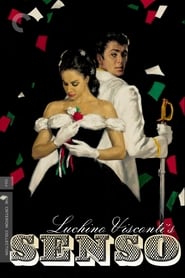The sets and costumes bespeak wealth, privilege, and especially the casual acceptance of them in a way that no dialogue could adequately convey. If decor is as important an element as characters, camera work, and plot in many films, in Visconti’s, the ante is upped—decor is destiny.[…]
It is not exactly an accident that the film brings to mind Manet, Veronese, Tintoretto, and Titian, among others. It is as if we were in a Manet painting twenty-four frames a second. Which is not to say that it has the studied, frozen, waxwork, art-directed quality of a period film like Barry Lyndon (1975), about which critics raved that each frame was a masterpiece. Senso is much more fluid than that. You don’t want to hang the images on the wall. You want to live in them.
— Mark Rappaport (Criterion)
[The film] is quite obviously the stuff of melodrama and tacky romance, with dialogue that really does the material few favors. But that’s intentional, with Visconti attempting to heighten every aspect of the film so as to make more clear the film’s allegory to the Italy he knew in 1953. That doesn’t excuse Senso’s cliches, but it does explain them. Like Douglas Sirk or Rainer Fassbender, the ridiculousness of Visconti’s melodrama is a conscious choice. It threatens to collapse the entire film under its weight, but never quite succeeds, especially when the movie begins to shift modes during its second half into something approximating a war movie. […] Of course, other films are as beautiful or more so than Senso. Its control is exacting but less stunning than for instance Kubrick’s, its technicolor is brilliant in portions but at other times a tad sterile and while it is personal, Senso never gives us more than surface examinations of its characters. That’s not to say it’s bad, just that it’s not as unique as it once was and anyone watching it today needs to be prepared to take in a lot of bad with its good. The film has aged not because it lacks its original potency—if anything its recent restoration makes the film’s craft more impressive now than it has been for 50 years—but because what it does well has been done again even better, and what it does poorly is difficult to overlook.

